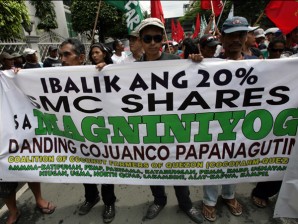‘Coco levy saga far from over’ – lawyer

Coconut farmers from Southern Tagalog troop to the Supreme Court building in Manila last September 20 to press for the re-opening of the case to recover the multi-million peso coco levy fund.INQUIRER PHOTO / NIÑO JESUS ORBETA
LUCENA CITY, Philippines – The return of P56.5 billion coconut levy fund to the government from the redemption of the 24 percent San Miguel Corp shares was only a partial victory for the country’s coconut peasants, a lawyer for several coconut farmers group said Monday.
“The coco levy saga is far from over,” Marco Sardillo III said in an email interview.
Sardillo, former executive director of the Presidential Commission on Good Government, explained that the recovered fund was just one part of Civil Case No. 33-F which itself is but just an eighth of Civil Cases Nos. 33-A to H, all pertaining to the disposal of the multi-billion pesos coconut levy fund.
“Justice will not be complete until the 20 percent SMC shares are restored to the hands of their rightful owners – and that chapter in our history won’t be set aright, until all these coco levy cases are resolved,” Sardillo said.
In April 2011, the Supreme Court voted 7-4-4 awarding 20 percent of SMC shares to known Marcos crony and current SMC chair Eduardo “Danding” Cojuangco Jr.
Article continues after this advertisementCojuangco, President Benigno Aquino’s uncle, holds at least P85 billion worth of SMC shares that the farmers claimed were bought with coco levy funds.
Article continues after this advertisementLast month, some 3,000 coconut farmers from Quezon province, including children, submitted a letter to the Supreme Court urging its committee on ethics and ethical standards to investigate the high tribunal’s “questionable” April 2011 ruling declaring that Cojuangco’s SMC shares were “not ill-gotten”.
Fr. Edwin Garriguez, executive director of the Catholic Bishops’ Conference of the Philippines-National Secretariat for Social Action (CBCP-Nassa) also sent a similar letter to the high court.
Sardillo urged the Aquino administration to keep the P56.5 billion “intact and secured from those who may have designs or interests that deviate from the clear instruction of the January 2012 decision of the Supreme Court: that it may only be used for the benefit of all coconut farmers and for the development of the entire coconut industry”.
“From now on, and until a law is passed and policies are set and determined on how best to benefit the coconut farmers, we should all keep a close watch to ensure that the money is not dissipated,” the lawyer said.
Sardillo has expressed serious concern on the reported plan of the Aquino administration to lend part of the recovered fund to finance the government anti-poverty program.
“With the 2013 elections just around the corner, such loans or advances would not just be suspect, they will be ill-timed,” the lawyer warned.
He recalled that during last year’s hearing on the coco levy bill being push by Senate President Juan Ponce Enrile, the veteran lawmaker had said: “So much of the money of the coconut industry was lost because of shenanigans by the people assigned to handle them.”
“I hope that those words serve as a lesson and that we heed them as a warning. Never again,” Sardillo said.
Sardillo suggested to different farmer groups to be united in their demand to keep the fund intact as a perpetual trust fund for the coconut industry.
“If they divide and distribute the funds now – apart from the logistical difficulties that might become fodder for corruption, then at best, that represents a couple of thousand pesos in the hands of this generation of coconut farmers. When the money is gone, what happens then?” he said.
He added: “If the farmers keep their fund intact, then they preserve it for their families and for future generations of coconut farmers. “
He maintained that the continued existence of the coconut levy fund would show “in clear and economic terms, the amount of power that these farmers possess – if they decide to stick together.”
“That fund is economic and political power that they possess and can wield to ensure that their issues are heard by any administration and addressed by all politicians, long after 2016,” Sardillo stressed.
“If they divide it and part ways now, then they part, too, with that golden opportunity to be recognized as a sector to be listened to, and a force to be reckoned with,” he said.
Meanwhile, disappointed with President Aquino’s continued silence on coco levy issue, a peasant group reiterated their warning that the administration candidates will be rejected in next year’s election.
“With P-Noy’s continued stony silence, the millions of coconut farmers in different parts of the archipelago would surely campaign hard to reject Aquino candidates. And with the start of the election season, we will also start our own ‘reject Aquino bets’ and educational campaign,” Jansept Geronimo, secretary general of the Coalition of Coconut Farmers of Quezon, said.
Quezon farmers are believed to be the biggest contributor to the coconut levy fund.
The coconut levy was a tax exacted from coconut farmers from 1973 to 1982, during Marcos’ martial law regime, supposedly to develop the coconut industry.
The collected levy was used by Cojuangco, a known Marcos crony, to acquire shares of stock in food and beverage giant SMC while he was president of state-owned United Coconut Planters’ Bank.
After the ouster of Marcos in 1986, the SMC shares were sequestered by the government. Then valued at P2 billion, it is now estimated to be worth P200 billion.